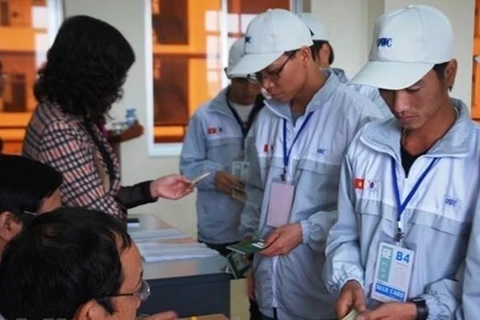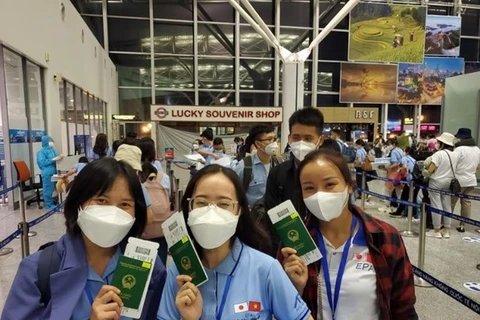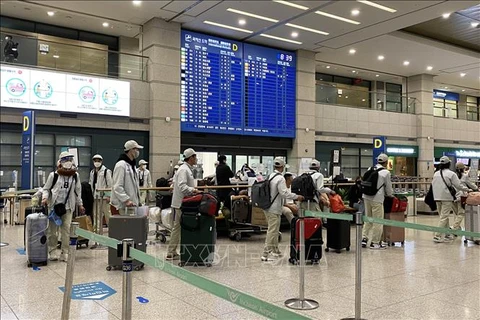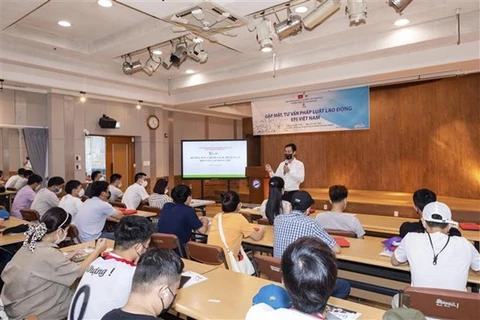Hanoi (VNA) – The number of workers going to work abroad in nine months of this year is 10 times higher than the same period last year, with Japan being the biggest recipient market.
In the last three months, the number of guest workers has rebounded as recipient markets become busier after the pandemic.
In August alone, over 30,000 went abroad for work, thus meeting the yearly target in only nine months.
Number of guest workers more than doubles
According to the Ministry of Labour, Invalids and Social Affairs, businesses sent a total of 103,026 workers abroad for work under contracts. This is a full 114.4 percent of the yearly target, marking a 2.4-fold increase from the same period last year.
Japan continues to be the largest recipient of Vietnamese workers leading others in the past nine months with 51,859 people. It was followed by Taiwan (China) with 44,584, the Republic of Korea (RoK) 1,668, Singapore 1,498, China 643, Romania 540, Hungary 522, Russia 318, and Poland 315. Vietnamese workers do go to other markets as well but in less significant numbers.
In September alone, as many as 8,180 went to work abroad, marking a 10-fold rose from the same period last year, including 5,027 in Taiwan, 2,775 in Japan, 168 in China, 49 in Singapore, 46 in Hungary, 21 in the RoK and Russia each, 18 in Algeria, 17 in Hong Kong (China) and Poland each.
A representative from the MoLISA’s Department of Overseas Labour said since COVID-19 was put under control in Vietnam and the world early this year, the activity of sending contract workers abroad has gradually resumed.
The MoLISA has adopted measures to develop overseas labour markets. They have proceeded to negotiate with Israeli authorities about the Vietnam-Israel labour cooperation agreement. MoLISA has also drafted a Memorandum of Understanding (MoU) on agriculture labour with Australia, and built an Agreement on labour recruitment between Vietnam and Thailand.
The MoLISA completed a MoU on skilled labour migration and knowledge exchange with Germany, and discussed a MoU on labour recruitment, employment and repatriation between the Vietnamese and German Governments.
It also directed enterprises to maintain and develop labour recipient markets, and to obtain information about COVID-19 situation and the latest relevant regulations. They have also instructed companies to send workers abroad in line with pandemic prevention and control regulations in the host countries.
Expanding opportunities for skilled workers
In Japan, the biggest labour recipient source, workers have more chances to work in better conditions with high wages, especially skilled workers.
Deputy Minister of Labour, Invalids and Social Affairs Nguyen Ba Hoan said that over the past three decades, more than 350,000 young Vietnamese have come to Japan to receive training in new skills. Since 2013, the number of Vietnamese trainees entering Japan has risen sharply, from 10,200 in 2013 to 82,700 in 2019. Up to now, Vietnam is the leading country among 15 countries sending trainees to Japan, with over 200,000 working here.
Hoan said Vietnam and Japan signed a cooperation agreement on the Special Skilled Worker Programme in July 2019. Under the programme, the Vietnamese workers who meet requirements regarding qualifications, skills, and Japanese language are qualified to work in Japan for a period of five years. They will receive incentives in terms of salary, insurance, and benefits that are equivalent to those enjoyed by Japanese workers. Currently, there are about 41,000 Vietnamese special workers living and working in Japan.
The Korean market is also opening door for Vietnamese skilled workers. Under the Technical Labour Cooperation Programme (E-7) between Vietnam and the RoK, the two countries' competent agencies are promoting bilateral labour cooperation in shipbuilding.
He said Vietnam highly appreciates the RoK’s policies and guidelines in expanding the reception of technical workers. It is an important solution to deal with the shortage of manpower in the RoK and open up more opportunities for Vietnamese skilled workers in the country.
Minister of Labour, Invalids and Social Affairs Dao Ngoc Dung said the activity of sending contract Vietnamese workers abroad gradually resumed in 2022, mostly in Japan, RoK, and Taiwan (China).
He added that the MoLISA will consider the balance between workers at home and abroad to bring the best benefits to them. It will also focus on hi-quality workforce training to send them abroad for work to gain experience and return home to serve the country./.

























